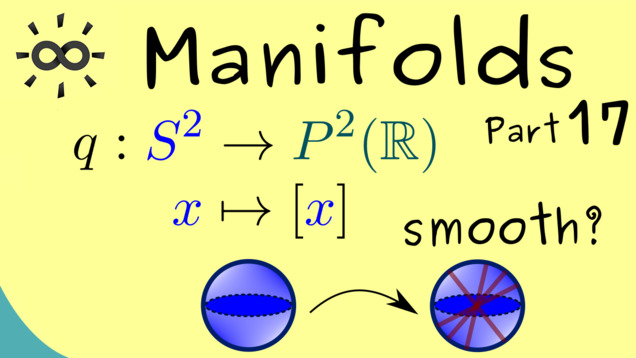
-
Title: Examples of Smooth Maps
-
Series: Manifolds
-
YouTube-Title: Manifolds 17 | Examples of Smooth Maps
-
Bright video: https://youtu.be/RfhEzRlLQqA
-
Dark video: https://youtu.be/CpR289HAhwQ
-
Ad-free video: Watch Vimeo video
-
Quiz: Test your knowledge
-
Dark-PDF: Download PDF version of the dark video
-
Print-PDF: Download printable PDF version
-
Thumbnail (bright): Download PNG
-
Thumbnail (dark): Download PNG
-
Subtitle on GitHub: mf17_sub_eng.srt missing
-
Timestamps (n/a)
-
Subtitle in English (n/a)
-
Quiz Content
Q1: Let $S^1$ be the one-dimensional sphere and $i: S^1 \rightarrow \mathbb{R}^2$ the inclusion map. Is $i$ differentiable at $\binom{0}{1}$?
A1: Yes, since we can use the chart $h( \binom{x_1}{x_2} ) = x_1$ for $\binom{x_1}{x_2} \in S^1 \setminus { \binom{0}{-1} } $ and then $i \circ h^{-1}$ is differentiable at $\binom{0}{1}$.
A2: No, there could be charts where $i \circ h^{-1}$ is not differentiable at $\binom{0}{1}$.
A3: One needs more information.
Q2: Let $S^1$ be the one-dimensional sphere and $P^1(\mathbb{R})$ the one-dimensional projective space. Is $k$ given by $k( \binom{x_1}{x_2}) = \frac{x_1}{x_2}$ on a suitable domain a chart for $P^1(\mathbb{R})$.
A1: Yes, it is.
A2: No, it isn’t.
A3: One needs more information.
Q3: Let $S^1$ be the one-dimensional sphere and $P^1(\mathbb{R})$ the one-dimensional projective space and $p: S^1 \rightarrow P^1(\mathbb{R})$ the canonical projection. Let $h$ given by $h( \binom{x_1}{x_2} ) = x_1$ for $\binom{x_1}{x_2} \in S^1 \setminus { \binom{0}{-1} } $ and $k$ given by $k( \binom{x_1}{x_2}) = \frac{x_1}{x_2}$ be a chart for $P^1(\mathbb{R})$. What is $k \circ p \circ h^{-1}$?
A1: $$ x_1^\prime \mapsto \frac{x_1^\prime}{\sqrt{1 - (x_1^\prime)^2}} $$
A2: $$ x_1^\prime \mapsto x_1^\prime $$
A3: $$ x_1^\prime \mapsto (x_1^\prime)^2 $$
A4: $$ x_1^\prime \mapsto \frac{x_1^\prime}{\sqrt{1 + (x_1^\prime)^2}} $$
-
Last update: 2024-10